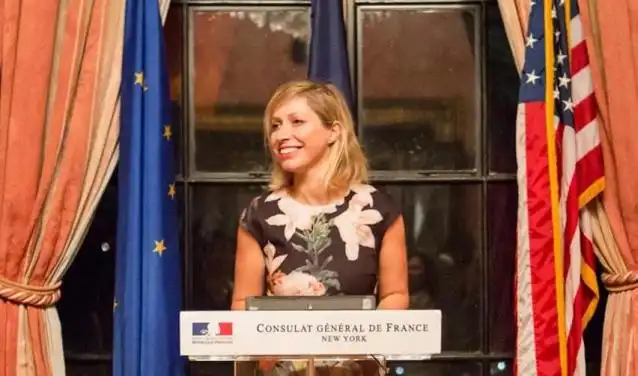Home>Anne-Claire Legendre: I received the tools I needed to become a diplomat
30.09.2020
Anne-Claire Legendre: I received the tools I needed to become a diplomat
Up until September 2020, Anne-Claire Legendre served as the Consul General of France in the United States, tending to French citizens and promoting French influence abroad. Meeting with the Sciences Po American Foundation in New York, she explained that her education at Sciences Po gave her the skills she needed to become a diplomat.
Legendre initially studied literature and languages but claims she realized while studying languages that she wanted to better “understand the contemporary challenges of our time.” Sciences Po, she believes, opened up for her “a new understanding” and gave her the tools to grasp not only political science, but also economics and law. Her constitutional law classes, in particular, left her with a lasting impression. In her view, constitutional law “should be taken not just by students that have the privilege to go to Sciences Po, but by any student in France, because they are so key to the democratic fabric of our society.” Thanks to Sciences Po, Legendre gained not just a new understanding, but “the tools (she) needed to become a diplomat.”
Legendre’s role as Consul General in New York had a twofold mission. She took care of the French community in New York, aiding the approximately 100,000 French citizens living in the tri-state area with ID cards, social services, French schools, and voting in elections. She describes the time of Covid-19 as a particular challenge, helping French people on a daily basis to cross the Atlantic, reunite with their families, or even face drastic health conditions. The second part of her role as Consul General was to promote the influence of France in all its aspects, including political priorities such as climate policy or gender equality. Equally important, however, is promoting French businesses, culture, and traditions such as wine and gastronomy, and trying to give them “the best visibility possible in the tri-state area.” Mobilizing a network of contacts was key for Legendre in order to transmit innovations happening in France. “Culturally and intellectually speaking,” she says, “there are a lot of predictions coming from France that are completely relevant to the U.S.”
A highlight of Legendre’s posting was the dynamic New York community. “New York offers the most impressive pool of talents. You meet a lot of smart people from the French community and of course from the New York community here,” she says. “I love New York City because of the dynamism, the incredible drive that people have.” She appreciates “the space in New York given to people from different backgrounds, different identities, different parts of the world, to actually thrive in the city. It's a fantastic melting pot for creativity and for projects.”
After leaving New York, Legendre will take up a new posting as Ambassador to Kuwait. “It's a region I know well, because I was trained as a diplomat on Middle Eastern issues,” she says. “Prior to New York City, I was the Middle East advisor to our foreign minister.” She describes how Kuwait plays an integral part in diplomatic strategy. “It's a country that is in the middle of a region, which is key for our stability, for our security,” Legendre says. “Kuwait plays a very important role as a facilitator and moderator.”
When asked for her advice, Legendre encourages current Sciences Po students and young graduates, especially women, to explore careers in diplomacy. “We need more female diplomats, there are not enough of them,” she says. “I really encourage young women to follow this path.” Legendre says the current global context is especially exciting for the future of diplomacy. She describes a new mode of working that has arisen since the Paris Accords, a type of work she calls “3D Diplomacy 2.0.” Rather than traditional diplomatic relations centered around state-to-state actors, diplomacy today requires “opening the door for discussion with a great variety of actors, including private sector actors and civil society.” Legendre lists some of the essential questions diplomacy must tackle: “What should be the regulation of new technology? Where is the international competition on the internet? What is the impact on our democracies?” “It is absolutely fascinating,” she adds, “to build a whole new chapter of international law.”
This article was written by Claire Wilson, student in the dual degree program between Sciences Po and Columbia University, and intern at the Sciences Po American Foundation.
More information
